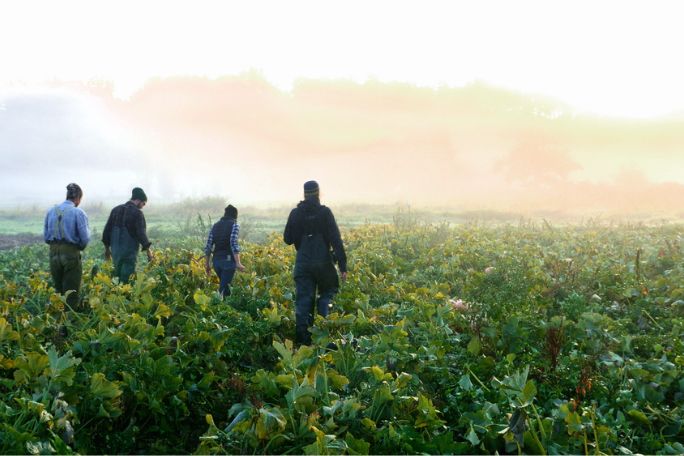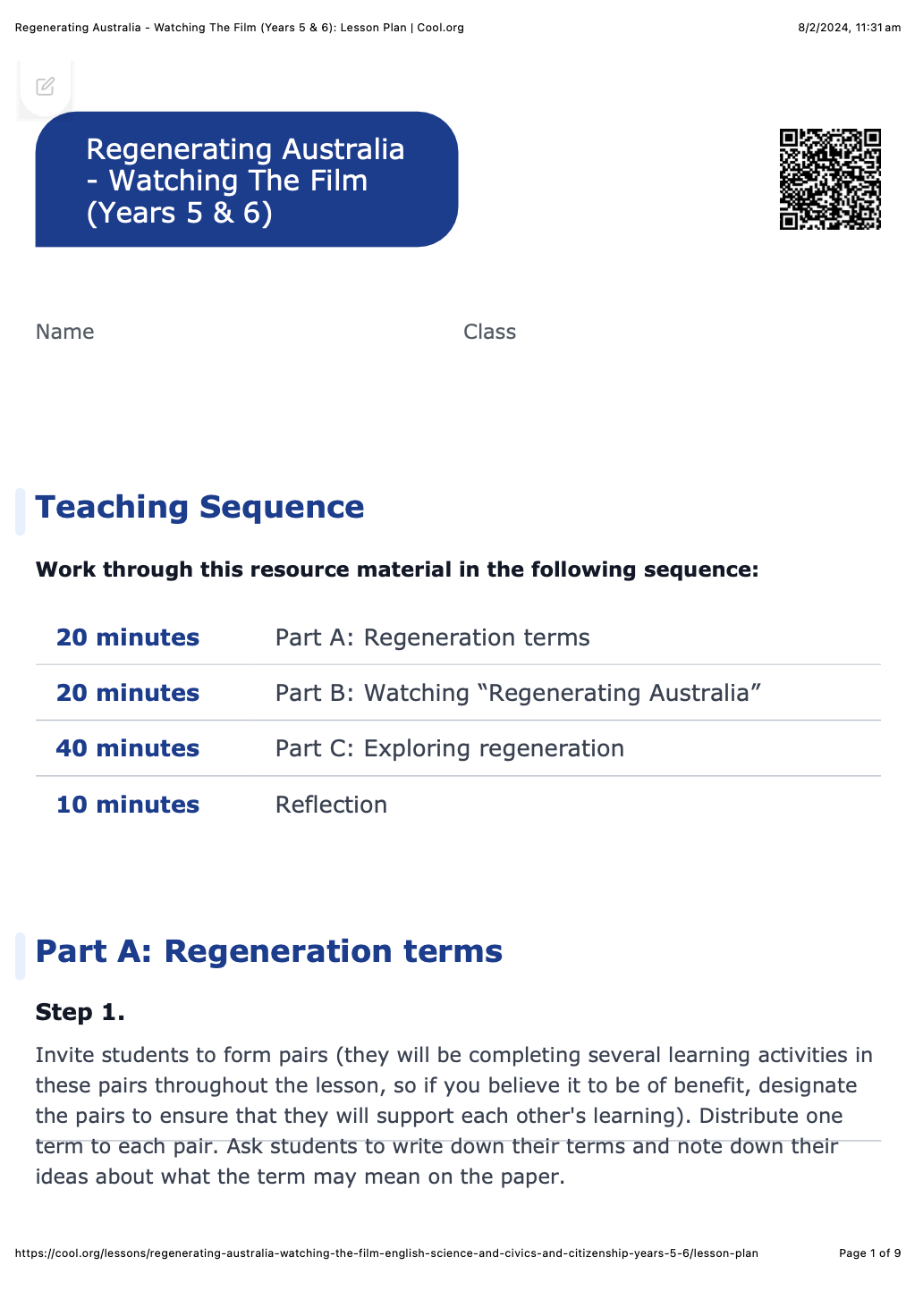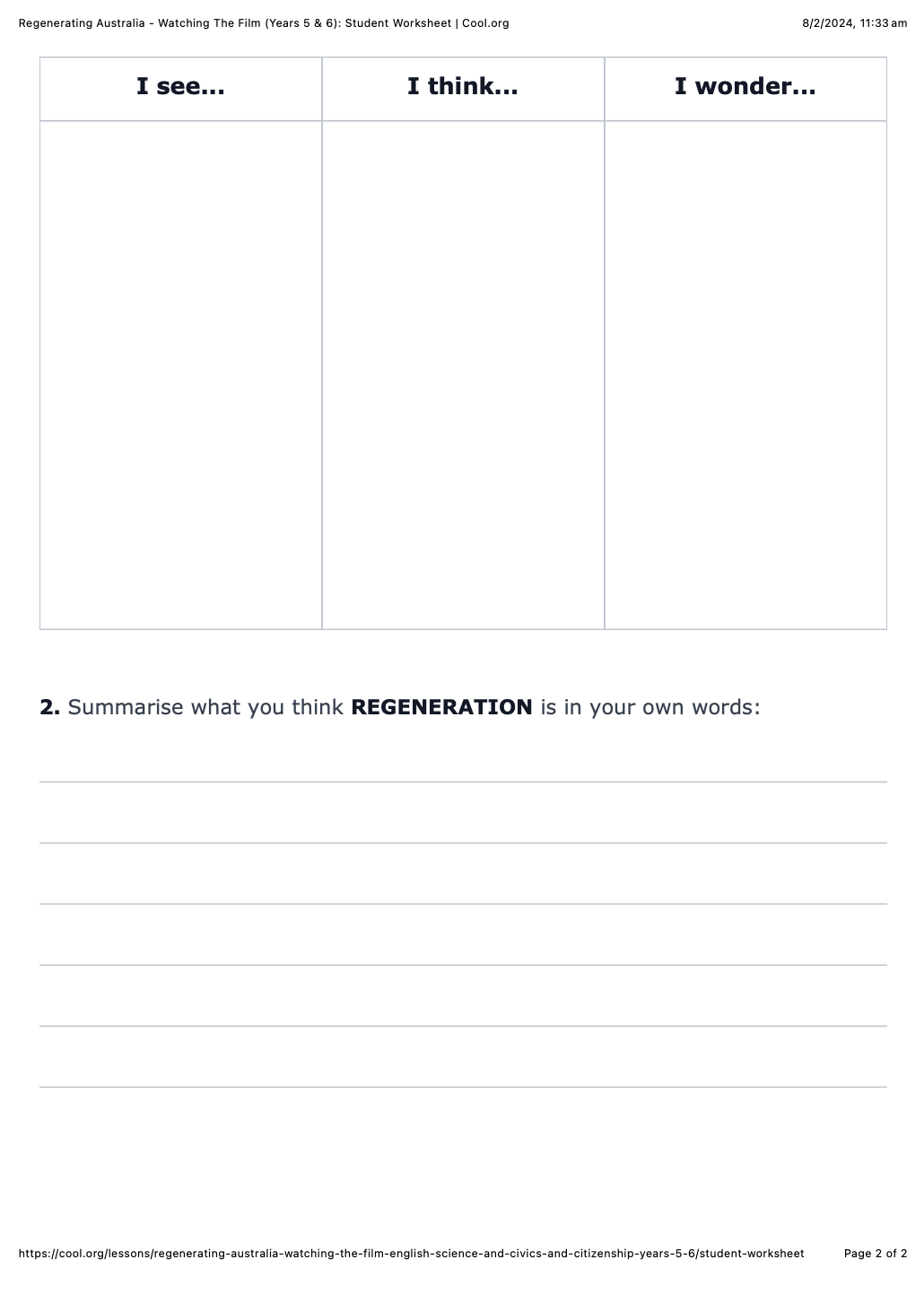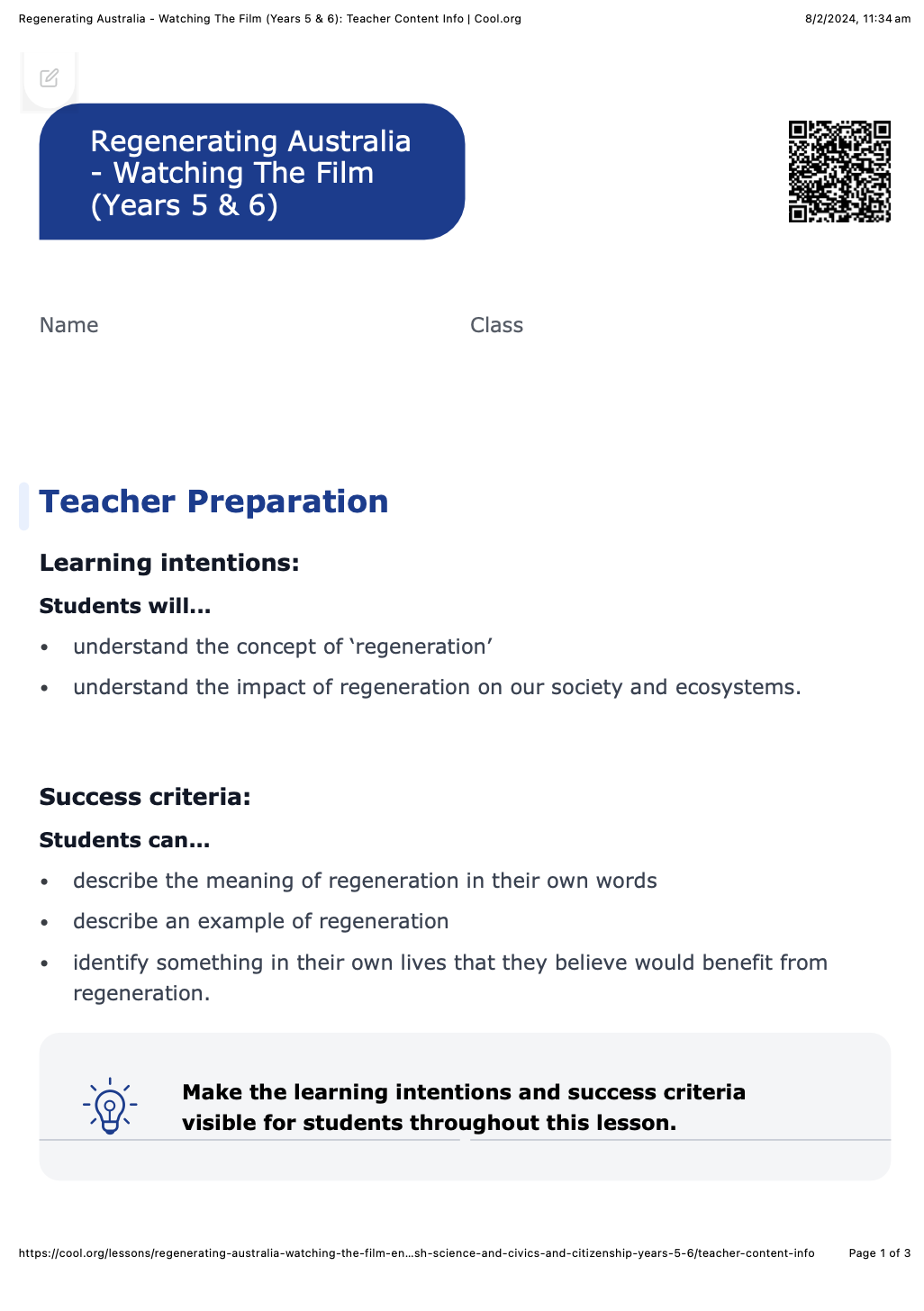Lesson summary
In this lesson, students will work towards understanding the concept of ‘regeneration’ and the impact of regeneration on our communities and ecosystems. They will review their understanding of a set of key terms, then watch the film “Regenerating Australia”. They will make their thinking about the film visible through the See/Think/Wonder tool, then read through a factsheet on regeneration. They will summarise their understanding of regeneration, then extend their understanding through a Gallery Walk activity, before returning to their summaries as a reflection exercise.
Learning intentions:
Students will...
- understand the concept of ‘regeneration’.
- understand the impact of regeneration on our society and ecosystems.
Success criteria:
Students can...
- describe the meaning of regeneration in their own words.
- describe an example of regeneration.
- identify something in their own lives that they believe would benefit from regeneration.
Lesson guides and printables
Lesson details
Curriculum mapping
Australian curriculum content descriptions:
Year 5 English:
- Use interaction skills, for example paraphrasing, questioning and interpreting non-verbal cues and choose vocabulary and vocal effects appropriate for different audiences and purposes (ACELY1796).
- Use comprehension strategies to analyse information, integrating and linking ideas from a variety of print and digital sources (ACELY1703).
- Plan, draft and publish imaginative, informative and persuasive print and multimodal texts, choosing text structures, language features, images and sound appropriate to purpose and audience (ACELY1704).
Year 5 HASS:
- The influence of people, including Aboriginal and Torres Strait Islander Peoples, on the environmental characteristics of Australian places (ACHASSK112).
- The environmental and human influences on the location and characteristics of a place and the management of spaces within them (ACHASSK113).
- The impact of bushfires or floods on environments and communities, and how people can respond (ACHASSK114).
Year 5 Civics and Citizenship:
- How people with shared beliefs and values work together to achieve a civic goal (ACHASSK118).
Year 6 English:
- Participate in and contribute to discussions, clarifying and interrogating ideas, developing and supporting arguments, sharing and evaluating information, experiences and opinions (ACELY1709).
- Use interaction skills, varying conventions of spoken interactions such as voice volume, tone, pitch and pace, according to group size, the formality of interaction and needs and expertise of the audience (ACELY1816).
- Use comprehension strategies to interpret and analyse information and ideas, comparing content from a variety of textual sources including media and digital texts (ACELY1713).
- Plan, draft and publish imaginative, informative and persuasive texts, choosing and experimenting with text structures, language features, images and digital resources appropriate to purpose and audience (ACELY1714).
Year 6 Civics and Citizenship:
- The shared values of Australian citizenship and the formal rights and responsibilities of Australian citizens (ACHASSK147).
- The obligations citizens may consider they have beyond their own national borders as active and informed global citizens (ACHASSK148).
Syllabus outcomes: EN3-1A, EN3-3A, EN3-2A, HT3-3, GE3-3, GE3-3
General capabilities: Literacy
Cross-curriculum priority: Sustainability, Aboriginal and Torres Strait Islander Histories and Cultures
Relevant parts of Year 5 & 6 English achievement standards:
When reading, students encounter and decode unfamiliar words using phonic, grammatical, semantic and contextual knowledge. They analyse and explain literal and implied information from a variety of texts. They develop and explain a point of view about a text, selecting information, ideas and images from a range of resources. Students create imaginative, informative and persuasive texts for different purposes and audiences.
Relevant parts of Year 5 Geography achievement standards:
Students identify and describe the interconnections between people and the human and environmental characteristics of places, and between components of environments. They identify the effects of these interconnections on the characteristics of places and environments.
Relevant parts of Year 5 Civics and Citizenship achievement standards:
Students identify various ways people can participate effectively in groups to achieve shared goals and describe different views on how to respond to a current issue or challenge.
Relevant parts of Year 6 English achievement standards:
Students select and use evidence from a text to explain their response to it. They listen to discussions, clarifying content and challenging others’ ideas. Students create detailed texts elaborating on key ideas for a range of purposes and audiences. They make presentations and contribute actively to class and group discussions, using a variety of strategies for effect.
Relevant parts of Year 6 Civics and Citizenship achievement standards:
Students explain the role and importance of people, institutions, and processes to Australia’s democracy and legal system. They describe the rights and responsibilities of Australian citizens and the obligations they may have as global citizens.
Level of teacher scaffolding: High – support student movement around the classroom during learning activities, and facilitate class discussions.
Resources required
- Access to the film Regenerating Australia
- A device capable of presenting a video to the class
- Student Worksheets – one copy per student
- Regeneration factsheet
Skills
This lesson is designed to build students’ competencies in the following skills:
- Critical thinking
- Creativity
- Communication
Additional info
Regenerating Australia is a Regen Studios film developed and produced in association with WWF-Australia. Cool.org and Regen Studios would like to acknowledge the generous contributions of Shark Island Foundation, Documentary Australia Foundation, and our philanthropic partners in the development of these teaching resources.




Welcome back!
Don't have an account yet?
Log in with:
By signing up to Cool.org you consent and agree to Cool's privacy policy to
store, manage and process your personal information. To read more, please see
our privacy policy here(Opens in new tab).
Create your free Cool.org account.
Many of our resources are free, with an option to upgrade to Cool+ for premium content.
Already have an account?
Sign up with:
By signing up to Cool.org you consent and agree to Cool's privacy policy to
store, manage and process your personal information. To read more, please see
our privacy policy here(Opens in new tab).